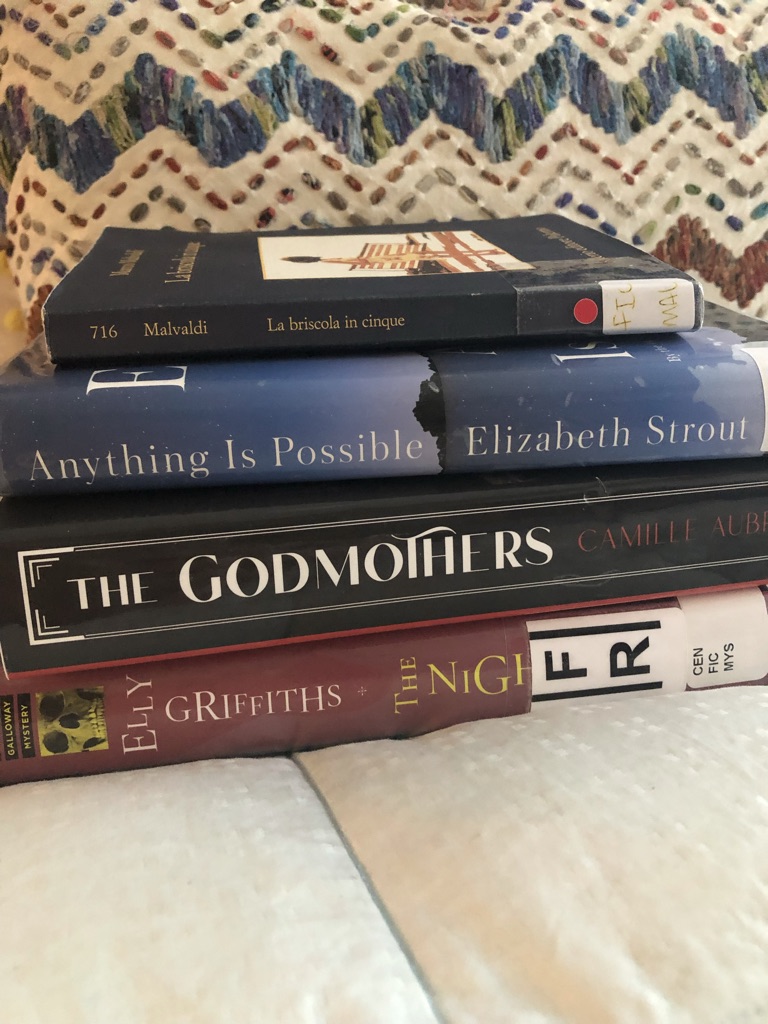
1. My Name Is Lucy Barton. Elizabeth Strout. Literary fiction. American contemporary. Women’s lives. Fictional writer’s memoir. Highly recommended.
So pleased to get this from VPL so quickly after having read Oh William! Should have read this first but both stand up well independently.
Looking through a few reviews online I came across a critic who called Strout’s writing “compassionate realism” and the term resonated immediately. Lucy Barton’s mother and father were clearly inadequate — and worse — as parents, but as horrific as Lucy gradually reveals her childhood to have been, Strout has Lucy still able to recognize her mother’s humanity, her love, stifled desires, pain. And Strout stages such a complicated, difficult, and beautifully imagined/observed situation (scenario?) having them together in a hospital room for weeks while Lucy Barton’s husband is mostly (and suggestively) absent.
Strout’s (Lucy’s) gradual revelations are almost sly, but the shock effect they (might) have is buffered by the gentle, measured tone — and the reader’s recognition that we’ve had the clues, we might almost have guessed. And, in fact, she leaves us to guess the worst parts. Highly recommended.
2. Dark Roads. Chevy Stevens. Thriller. BC Wilderness/small town setting; Missing Women/Highway of Tears.
Again, that Fast Reads shelf on a day when I wanted a more escapist read than the (very good) books I had on the go.
Set in my province, but in a small town much further north and quite remote, an area of wilderness in which women (mostly indigenous) have gone missing for decades, many presumably picked up along the “Highway of Tears” which runs between Prince Rupert and Prince George.
Honestly, the protagonists (in turn, two young women, late teens/early twenties) skew a bit young for me and the plot feels a bit contrived, but well written and interesting overall. And Stevens obviously knows this demographic and these small towns well — The depiction of wilderness and of survival in it (no spoilers, but wilderness survival is central to the plot) might have been my favourite part, well done!
3. Diary of a Young Naturalist. Dara McAnulty. Creative non-fiction. Eco-criticism. Nature writing. Autism. Coming-of-Age. Ireland.
This 14-year-old’s writing is so impressive, even just at the level of writing style. But then add the content — keen observation, near-encyclopedic knowledge, vulnerable honesty, and evident passion for the environment but also for his family.
He speaks movingly about his autism, about the difficulties it causes him socially, the energy he needs to manage his emotions. But he also points to the advantages autism gives him and the way it helps him clarify his priorities. Each paragraph, in fact, testifies to the enhanced observation he exercises toward all phenomena. Such a wealth of detail, so many stimuli that most of us would not notice. Dara writes, later in his memoir/diary, that he observes and stores away many sensory “photographs” which he then goes home and organizes through the process of writing. Reminds me of Wordsworth’s description of poetry as “the spontaneous overflow of powerful feelings . . . recollected in tranquility.” Although in McAnulty’s case, it seems that the recollection is part of a larger process that can yield tranquility but first must be worked through.
One to watch, this Dara McAnulty — worth noting that the well-known nature writer and critic Robert MacFarlane says of young (now 17 years old) McAnulty that he has “an extraordinary voice and vision: brave, poetic, ethical, lyrical, strong enough to have made him heard and admired from a young age.” Diary of a Young Naturalist has won numerous prestigious awards and been nominated for several others.
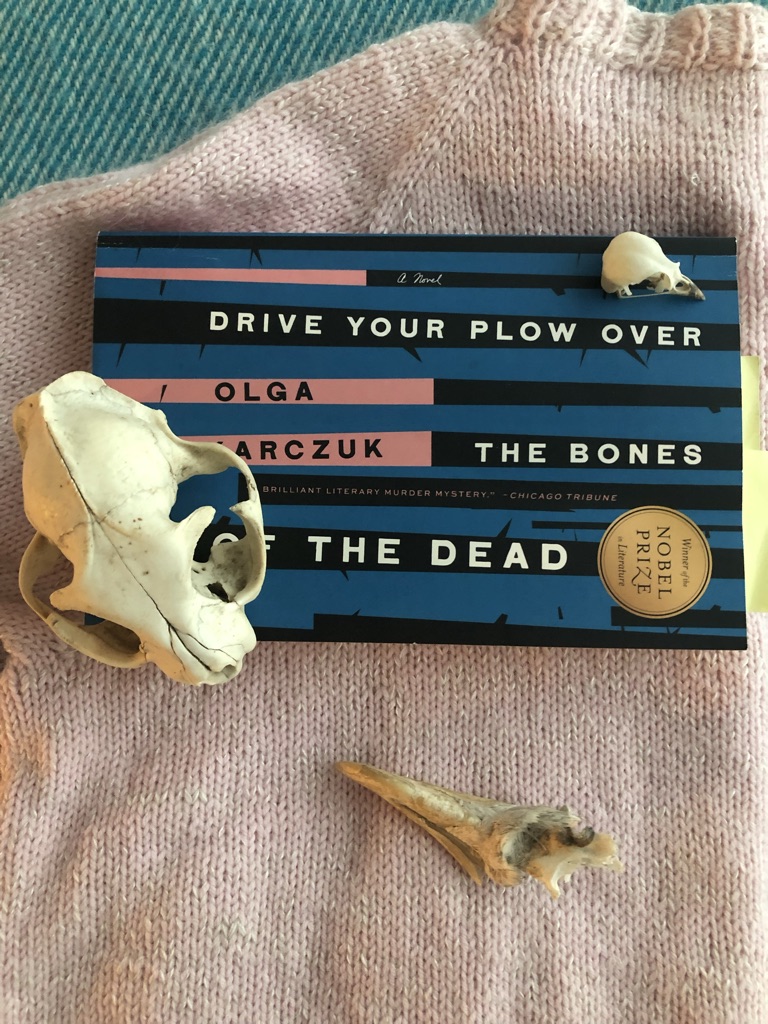
4. Drive Your Plow over the Bones of the Dead. Olga Tokarczuk. Trans. Antonia Lloyd-Jones. Literary fiction; Mystery; Strong female protagonist. Eco-criticism; Nature Writing. Polish writer. Literature in translation.
I hesitated to begin this because the title and, I guess, the fact that Tokarczuk is a Polish Nobel prize-winner made me think it would be too heavy, too serious. And certainly Tokarczuk draws attention to the environmental damage humans are causing and to our mistreatment of the other creatures with whom we share the world. In fact, this book had much resonance with Dara McAnulty’s memoir, and I kept drawing parallels and connections between the two: bats, beetles, and especially fieldfares — a bird I’d never heard of before, and now know about through McAnaulty who remembers a winter so cold that the migrating flock perished in Ireland . . . and through Tokarczuk’s eccentric protagonist, Janina (she dislikes her name intensely), who tells us that these birds will band together to chase away a predator hawk, sometimes collectively defecating on it as a way to deflect its attack!
Janina’s sympathies are with all animals and with a very small band of fellow eccentrics: Oddball, a neighbour; Dizzy, a Blake translator; Good News, a second-hand clothing shop owner; and Boros, an entomologist who’s cataloguing those insect species displaced by forestry. The small band draw together as a series of strange murders makes the village fearful, but Janina’s theories — that vengeful animals were punishing cruel hunters and corrupt humans and that a careful study of Astrology will point to the truth — are politely dismissed, even by her friends.
Very clever, very amusing, this book, without that cleverness or humour detracting from its undisguised eco-criticism. In several ways, Janina reminded me of Muriel Barbery’s concierge in The Elegance of the Hedgehog, or even, in other ways of Emerence in Magda Szabo’s The Door. All three are older women, eccentric, who don’t suffer fools gladly. . . Instagram post here.
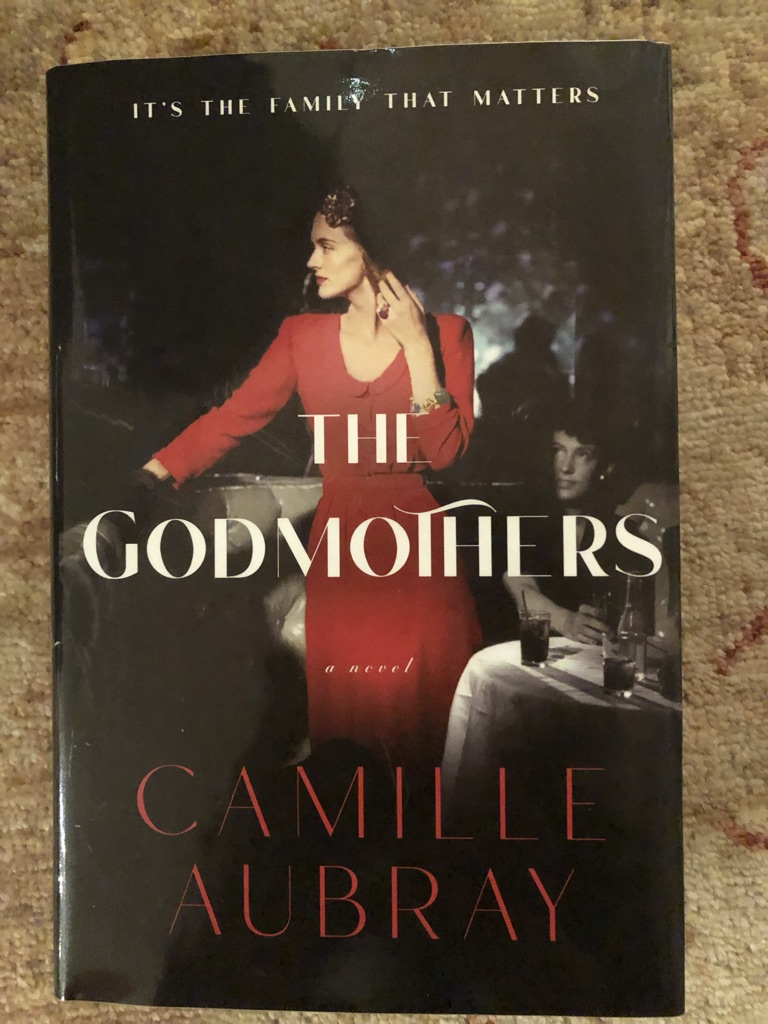
5. The Godmothers. Camille Aubray. Historical fiction (framed by a contemporary narrative). Italian-American family. Italian immigrants, US. New York city. Women’s lives. Female friendships. Romance.
Spotted this in new hardcover format on library shelf and the book flap blurb pulled me in. Well-written and engaging light fiction about 4 women joined via birth or marriage in an Italian-American family whose immigrant patriarch and matriarch have done well by staying one (barely) legal step away from Mafia — money-lenders who “pay tribute” to higher-ups, but are not (or seldom?) involved in violence. . . Not so for the sons’ and daughters’ generation and when the men are away during WWII, the women must manage operations. Thus they are godmothers to each other’s children, but also lean into being something like the other kind — Godmothers as counterparts to the Mafia version of Godfather. Friendships, personalities of these women, secrets, passions, romance, and historical fiction.
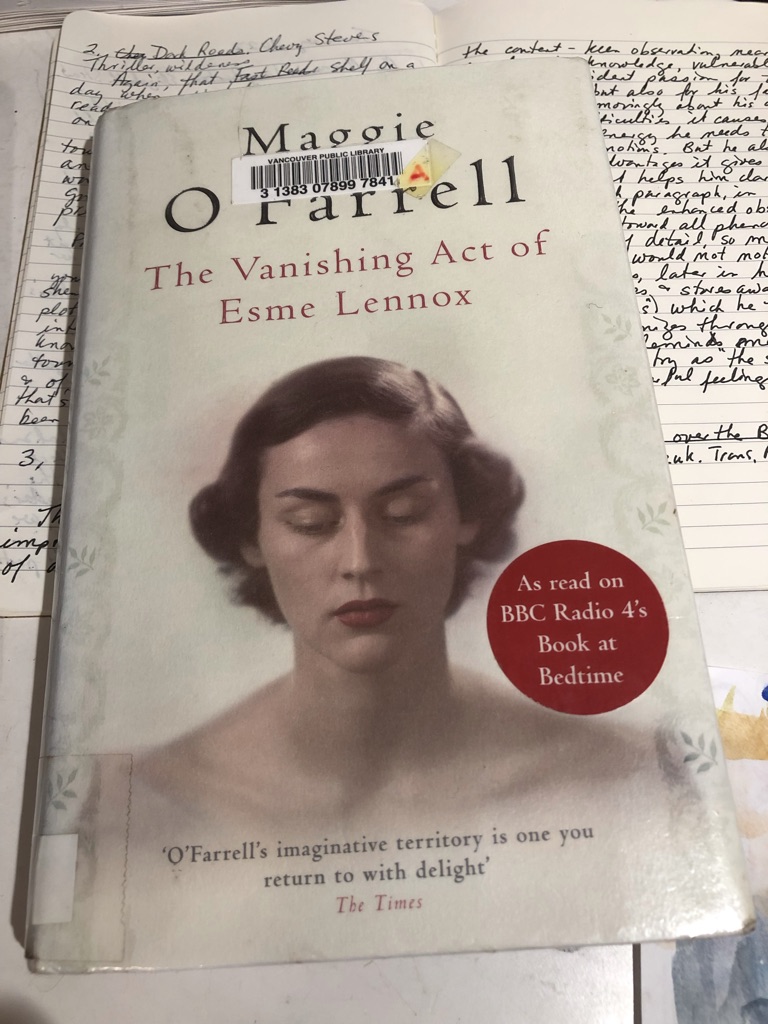
6. The Vanishing Act of Esme Lennox. Maggie O’Farrell. Literary fiction. Historical narrative revealed through parallel contemporary narrative. Women’s lives; “Difficult” Women consigned to asylums; Set in Edinburgh.
I’m more impressed by O’Farrell with each book I read (I wrote about Hamnet here and Confessions of a Heat Wave here). In this one, we move between a contemporary narrative featuring Iris, who deals in vintage wear, is having an affair with Luke (married but supposedly wants to live with Iris), and is very close to Alex, whom she considers as a brother because her mother lived with his father when they were 5 and 6.
The second narrative concerns two sisters who grew up in India but moved “back to Edinburgh” with their parents in their early teens. One of the sisters, Esme, has experienced a significant trauma which her family prefers not to talk about or address. She finds Scottish society in their class horribly confining and she ends up being confined to an asylum and forgotten for 60 years until Iris gets a call that the asylum is closing and an elderly relative she’s never heard of needs to be rehoused.
Beautifully imagined, thoughtfully told, moving, infuriating.
This would read well with Jocelyn Saucier’s And the Birds Rained Down which I wrote about in last month’s book post. Marie-Desneige (aka Aunt Gertrude) and Esme Lennox both fictional characters who spent decades in asylums to which they were committed by families who then apparently forgot their existence. Instagram post here.
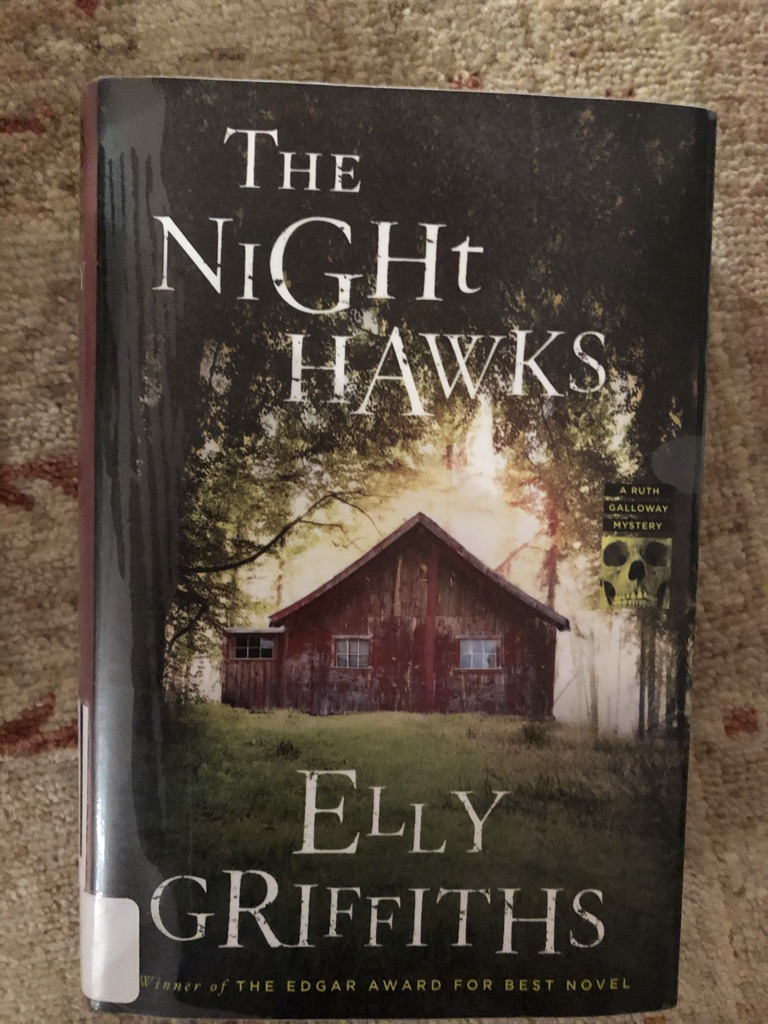
7. The Night Hawks. Elly Griffiths. Mystery. Police procedural. Forensic archaeology. Coastal England (North Norfolk). Female protagonist. Ruth Galloway series.
Found this on the Fast Reads shelf serendipitously and didn’t resist. Otherwise, I might have been done with Ruth Galloway after the last volume in the series.
And honestly, the first third of this one was reminding me of that — writing seemed formulaic and the narrative style too evident, obtrusive. Also, the plot was evidently connected to some possibly sinister vaccine trials and given the whole Covid situation, I worried about where that was going. And Ruth has left Frank, is back at her old uni, living in the little seaside home near so many old murder sites. And evidently she still has feelings for Nelson. . .
But. . . there is movement with some new characters, possibly recurring ones . . . and a new academic role for Ruth, a hint at the end of something changing for Nelson (he’s being urged to retire, remains stubborn, but change may be coming on other fronts).
The plot resolves satisfactorily enough although there are weaknesses. Mostly, I wish Griffiths might let her characters tell us something more about the human experience, particularly that of women approaching and moving into mid-life, of varying ways for ambitious and bright women to negotiate life with or without partners and/or children. Could Ruth not have more interesting sustained friendships with women? Or perhaps I just need to admit the idea for the series has taken it as far as can interest me?
Nope, I’d still rather admit I might read just one more, if only to find out if Nelson . . . Instagram post.

8. Anything Is Possible. Elizabeth Strout. Literary fiction. Linked short stories. Lucy Barton series. American contemporary. Regional American.
In this collection of linked short stories, an omniscient 3rd-person narrator aims a lens at one character after another — all are connected in some way to Lucy Barton, and at some point in the short story focussed on them, each character mentions her, offering a different perspective, building something of a hologram projection of Lucy.
And Lucy herself appears at one point, when she visits her brother and sister. Not only do we thus get her siblings’ view of her, but also that of the supposedly objective, dispassionate narrator. And Lucy’s behaviour is very different from what she has shown us in her 1st-person (fictional) memoir. Fascinating. Brilliant structurally, stylistically — but subtly, quietly brilliant.
And the stories in this collection are often gut-wrenching. Yet so many, many instances of compassion, moments of authentic human connection.
This phrase that recurred often: “She/he didn’t come from much.” I wonder how recognizably regional this is, an American phenomenon? mid-Western? Not that we don’t have class in Canada, but the phrase struck me as something honed, something precise, recognizable.
Highly recommended.
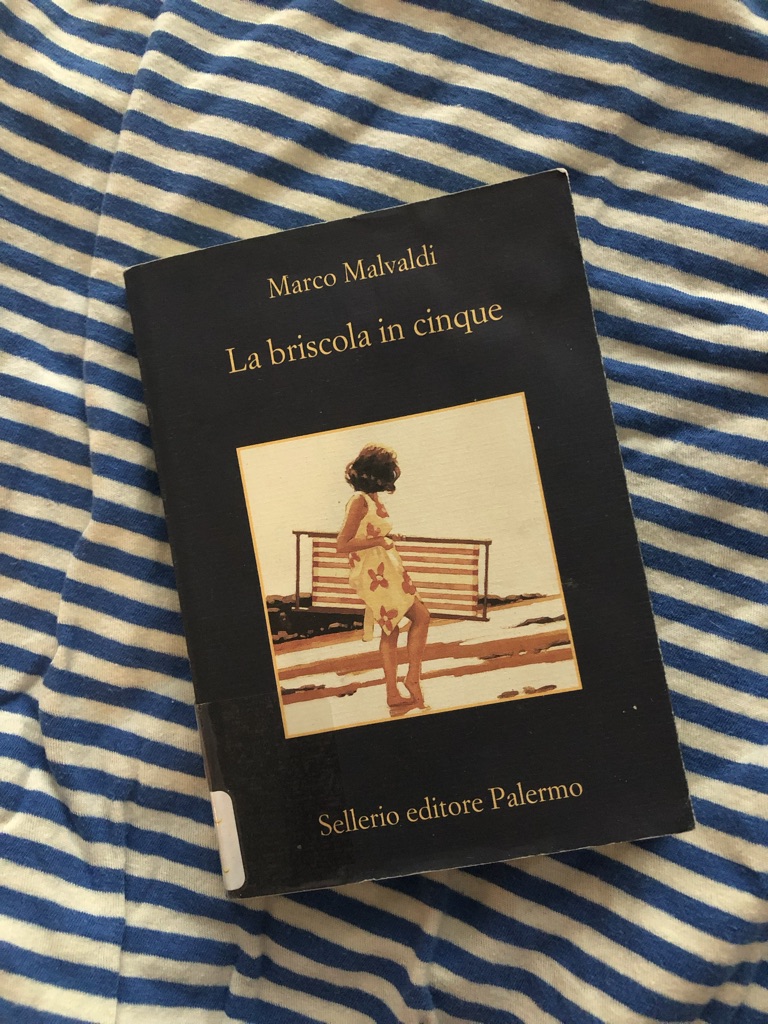
9. La Briscola in cinque. Marco Malvaldi. Murder Mystery/Crime Novel. Read in Italian. “un giallo.”
An elegant little libro tascabile (pocket-sized book), un giallo (mid-century Italian crime thrillers were generally published with yellow (giallo) covers) that I borrowed from la biblioteca at the Italian Cultural Centre here. This mystery published by Sellerio is the first volume in a series featuring bar-owner Massimo who takes an investigative role after he’s involved in finding the corpse of a young woman. Also features the four old men — i vecchietti — who hang out at the bar, gossiping, playing cards (la Briscola), enjoying gelato . . . Massimo’s Nonno (grandpa) Ampelio and his three friends. All set in a fictional seaside town — Pineta — on the Tuscan coast. Available in English as Game for Five.
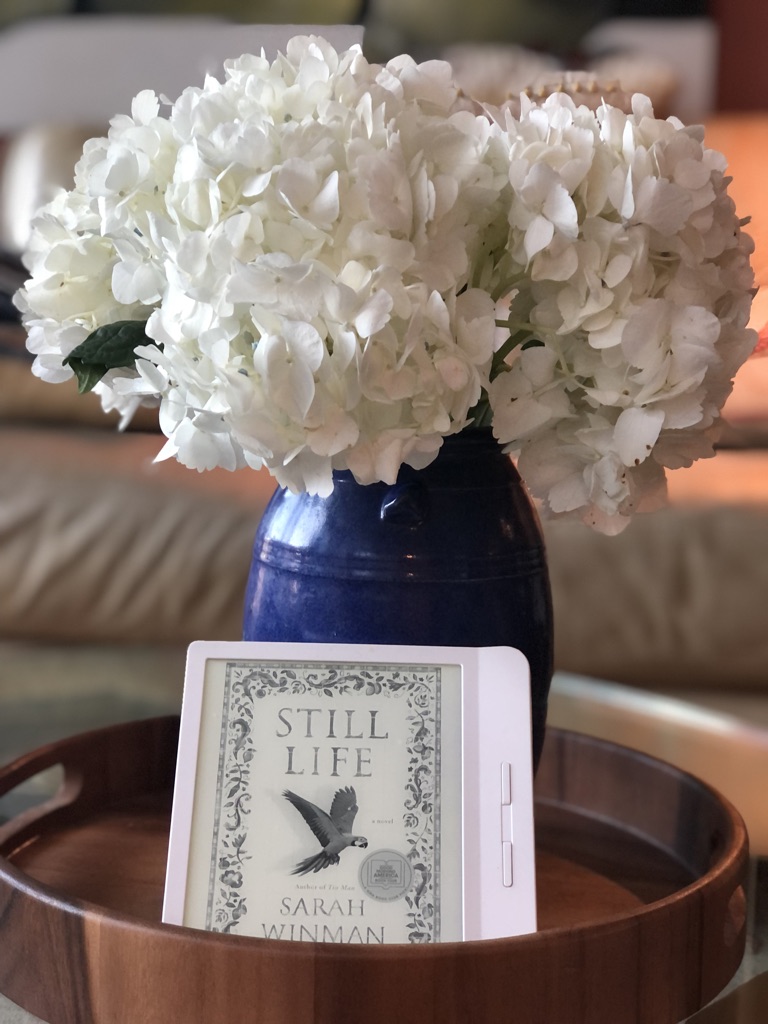
10. Still Life. Sarah Winman. Bestseller. Literary fiction. Historical fiction. Armchair travel. post-war Florence. ex-pat life. Love, friendship, alternative families. Art, music, food. LGBTQ.
Borrowed this ebook from VPL to read on my Kobo after seeing it recommended on Instagram by someone I know to be a discerning reader. And she was so right (again!). A delightful group of characters bound together in a narrative about romance and ex-pat life and loss and pain, chance and whimsy.
Begins just at the end of WWII with a sniper for the Allies, in Florence, meeting an older woman (introduced to us as lesbian — having lunch with a lover with whom she’s become very impatient — fascinating, iconoclastic, an art critic and teacher). The soldier returns to London but years later is pulled back to Florence and builds a life there with a young girl (his unofficially adopted daughter) and an old(er) man. . . and the crew just grows. . . . There’s a remarkably perspicacious parrot and trees that speak their quiet ageless wisdom
and a wonderfully droll, sometimes flip, sometimes sassy narrator who’s the best kind of omniscient and is a character in her own right although none of the characters in the novel ever discern her presence, only we alert readers.
Oh, and there are several grand romances here and more than a few deep and nurturing friendships and at least as many of these friendships and these romances are same-sex. No hetero-hegemony here (not surprising, then, to learn the author is lesbian. Sarah Winman mentions this in an engaging interview in The Florentine. If my enthusiasm doesn’t convince you to read Still Life, I suspect this interview might.
And Firenze/Florence as a character — oh yes! Such a satisfying armchair voyage. We even get to go back with one character (remember our iconoclastic lesbian art critic?) to her visit to Florence at the beginning of the 20th century — so that by novel’s end we’ve spent more than 100 years in the city.
A splendid novel that holds up the possibility of goodness and community and acceptance. Most entertaining! Highly recommended!
And that’s it. A very good reading month — the weather made books a better choice than boots and I was lucky to find so many good ones. What about you? Have you read any of these? Agree with my take on them? Disagree? Have others to recommend? Let’s chat. Comments open below (please note, though, that comments won’t show up when you first post them, but have to wait for me to Approve them. That way, none of us have to read the disagreeable Spam that arrives regularly).
Also please note that there’s an option below for you to share this post via Facebook, Twitter, or Instagram, and I would be grateful if you should ever feel inclined to do so.
Happy Reading,
f
‘Newish’ follower—first time commenter: I’m happy each time you post on your reads. I read Oh, William recently and loved it (I’m a big Strout fan). I went back and reread My Name is Lucy Barton and then read, for the first time, Anything is Possible. I look forward to your posts and have read a few of your pics that I may not have picked on my own. Thank you for taking the time to share your thoughts with your readers.
Author
Welcome, and thanks for letting me know you enjoy the posts, Donna!
What a lot of books in one month! I just finished writing up the books I read last year…with gaps, as I wait too long to record. Seeing your lists makes me want to do better again 🙂
Of your January haul, I only read Esme Lennox, which I liked a lot. But I also wanted to mention that I am in the process of finishing “The New Wilderness”, the first of the books from your 2021 list that I got from the library, and I stayed up twice past my bedtime to keep reading. Several titles more to sample…
Finally, your comment about the Olga Tokarczuk book made me chuckle…being German, I have read my fair share of what might be considered serious and heavy – some of those are of course very good 😉
That title seems an interesting read which I will absolutely consider…for now, I am working my way through the beginning of your 2021 list. Keep’em coming!
Claudia, from Eugene, OR
Author
I attribute that number of books (unusually high for one month, for me) to January’s weather! (I also often wait too long to record, by the way).
The New Wilderness — seems longer than a year since I read that (one of Dottoressa’s recommendations to me, I think — it’s always worth reading her comments here for suggestions!)
As for your chuckle, ha! I’m glad you caught my self-deprecating humour. I definitely go through periods when I choose from the pile with the lighter books! — I’ve read a good bit of serious and heavy literature as well (last year, Daša Drndić’s Trieste probably topped that list!) . . . but I don’t know that I’ve ever read such a concentration of it as when I took a couple of courses in German Literature (in translation) during my undergrad studies.
Thank you very much Frances <3
D.
Excellent titles indeed!
I’ve read only My Name is Lucy Barton (could read it once more-and Oh William is still waiting!)-so there are many gems to chose from your list
Some of my reading in January:
-Croatian traveller and travel writer Davor Rostuhar and his bride decided to spend their honeymoon travelling around the world for a full year,investigating what love means for different people around the globe . Result is a book “Love around the world” (and a two part documentary). It is fascinating indeed to read (and watch many photos)how, in this very moment,simultaneously,in various places on the planet Earth,there are nomadic hunter-gatherers tribes,than there are Matis people (in Amazon Rainforest) who had their first encounter with our civilization forty years ago . Women of Kinnaur people in Himalayas can have more husbands (they are usually brothers). Wodaabe tribe from Sahel has a yearly festival where men wear make up and dress up for women to choose their favourites…..and many,many other interesting facts,personal stories and traditions,and we could hear what love means for all of them
-Wonderful Maya Angelou’s Letter to My Daughter
-Very interesting Kwon Yeo-Sun’s Lemon,a thriller that is not a thriller, the murder of a young beautiful South Korean girl is unsolved,but we are dealing (or better,our narrators are dealing) with aftermath,grief,cruelty……and at the end we might know who and why the killer was.
-Sally Rooney’s Beautiful World,Where are You- is it a guidebook of her generation,as well as her other books? In Lemon,we have an unsolved murder that is solved through memories of people around the victim,here we start with Dating Apps (or childhood love that lacked real sincere communication so it was stacked between casual occasional sex and sex-less friendship) and,after of a lot of musings,feelings, painful emotions…..we have love for both couples. Happy end! Or….?
-Sara Collins’ The Confessions of Frannie Langton: maid/ lover of mentally unstable,drug addicted,manipulative Mrs Benham who lives in an unhappy marriage,goes on trial for murder of said couple.
But,Frannie is much more of that,living before as a slave on a plantation in Jamaica, where she is educated and her (white) father used her as help in horrible,Mengele-like experiments that are hard to forget.
Poignant and dark,Costa book awarded for first novel in 2019.
-Claire Wilcox Patch Work (recommended by Wendy last month) -excellent!
-Nita Prose’s ( lives in Toronto) novel The Maid.I really liked this lovely book about Molly The Maid, good-hearted girl who” struggles with social skills and misinterprets the intentions of others”so,when a murder occured in a Hotel that was her safe place,it was the beginning of exploring, not only whodunit,but ,also, who is real friend and who’s the enemy
Dottoressa
Author
Okay, so your January weather must have kept you inside as well! What a great list here — and you’ve even included a book by a new-to-me Canadian author, thank you!
I gave one of my daughters Beautiful World, Where Are You? for Christmas. Not borrowing it back yet because the pile on the coffee table is teetering dangerously as it is. . . But I’m putting almost everything here on my TBR list (and yours is now the 3rd recommendation I’ve seen for Patch Work, so I’d better add that, for sure!)
Ha,ha,yes,weather was good for reading,but I had to catch up for the weeks my son and his GF were here….it was such a joy,but a reading was sparse. It also helps that I start to work a lot of things outside the home and this includes a lot of waiting
D.
Between you and Dottoressa I’d be set up for books for a year. I too get a bit impatient with Ruth Galloway in Elly Griffiths books. But as much as they are not as good as some other mystery writers I love, I still enjoy them. And I’m always back to see what happens between Ruth and Harry.
Love, love, loved Anything is Possible. Love Elizabeth Strout. Read this one a couple of years ago at Mum’s and she was a bit pissed at me after a couple of days of my disappearing into my room to read too much. Thankfully I finished it and we were back on track with our visit. Ha. Coincidently, I just posted about all three of the Lucy Barton books because I finally read Oh William! which has been in my Kindle library for a while. Sigh. Loved that book so much.
As for Maggie O’Farrell. I adored Hamnet. But Instructions for a Heatwave left me cold and I did not finish it. Might have been my mood. I have The Hand That First Held Mine in my Kindle library and may wait a bit to start it.
I am off to check out that eco-mystery. Thanks as always for such wonderful reviews. Writing a review is so difficult. How to encapsulate in what ways a book has touched us? That is when one can’t just clutch it to their chest, look heavenward, and say, “Ohhhh, you HAVE to read this.” Ha.
Author
That was a lovely post on your blog yesterday on the Lucy Barton books.
It did take a while to get the rhythm of Instructions, but when the strands come together. . . but reading is so subjective and we don’t have to like all the same books to be kindred reading spirits, right?
Very impressive! I thought I did a lot of reading but only 7. I am glad you liked the Drive Your Plow Over the Bones of the dead. I liked it a lot too, loved the quirky protagonist. I am also a fan of Elizabeth Strout, I think have read all her works. have you read Olive Kitterage and Olive, Again.?
so in order
Deacon King Kong. James McBride. Set in the 1960’s a tale about the diverse residents of a housing project in Brooklyn NY. great writing , humor and much truth in their adventures and misadventures.
The Importance of Being Earnest, Oscar Wilde, the classic for book club
The Lost Village, Camilla Sten. Swedish, mystery horror. not usually my genre but the book promised a realistic look at mental illness. not the usual stereotypes. as a clinical psychologist who has worked many years with the mentally ill I was curious. Actually I was disappointed in that to me it reinforced these ideas.
Red Bones, Ann Cleeves. a Shetland crime novel. this author has always been reliable with her plots, interesting characters and backgrounds. perfect for a cozy Winter afternoon.
Elanor Oliphant is Completely Fine. Gail Honeyman. a popular novel of a few years ago I had been meaning to read. . a young women with a traumatic past, probably on the autistic spectrum tries to cope with life in modern Glasgow. through small acts of kindness and openness positive changes are made. hopeful and life affirming.
A Week in Winter. Maeve Binchy. another book club selection. ( different club) I understand why she is so popular. unfortunately I missed the discussion
The Night She Disappeared Lisa Jewel. mystery, suspense. not always believable, but it did keep me reading on yet another frigid day.
Now I have begun my February reading with a short story by Pushkin.
Author
Thank you! Sometimes readers do a service in steering me away from certain books, just as much as towards. I enjoy the subtle qualifying you do here. And it’s interesting how different our winter reading lists can look from those from other seasons. . .
I had never heard of fieldfares either, until I started reading “The Peregrine” by J.A. Baker a few days ago. I had to stop at once, because only through the first 20 pages or so I had to look up more words in the dictionary than I normally need in an entire book in English. All those birds… So I decided to make up a list of bird names and their German translations which hopefully will make further reading a lot smoother.
Before, I read “The Empress of Weehawken” by Irene Dische, in German translation, which appears to be very good. The book sums up the history of the author’s family (including her biography) and, by the way, the entire 20th century, as seen threugh the eyes of her grandmother. Tragic in places, very funny in others.
I also followed a recommendation on Sue Burpee’s blog and read “Patch Work” by Claire Wilcox. Very special, very poetic. I particularly loved her descriptions of the inner life of a museum, all that goes on behind the doors that say “Staff Only”. By the same author I got her book about bags, which I enjoyed for all the information about how social, economic, and technical changes are related to the development of fashion. But I also found that I am “bag-deaf”, so to speak, I do not care for bags at all, except for their practical purpose. So I think that book is going up for sale again.
Finally, I greatly enjoyed Tim Parks’ “Italian Ways”. The author uses his experiences of train travel in Italy as an entry point to explaning his view of Italian society and history from unification to the present day. Trenitalia as a metaphor of the entire country, so to speak. Being a keen train traveller myself, I found his book einlightening in more ways than one.
Author
I knew nothing of Baker’s The Peregrine, but I googled it and would love to spend time with it. I suspect it might also read well with Helen MacDonald’s H Is for Hawk. Isn’t it interesting how we can bump into whole lexicons of words we’ve never encountered, even in a languages we know fairly well (even in our mother tongues, I think).
Yet another recommendation for Patch Work!
And I, too, really liked Tim Parks’ Italian Ways. I read it in preparation for our first trip to Italy in 2014, and found the Trenitalia-as-Italy comparison pretty convincing. I still remember waiting on the train platform at Bari, all those huge screens playing commercial ads where nowhere could we find information about our train’s arrival or departure. Parks’ book helped explain that 😉 I’m delighted to know you’re finding it relevant as well!
Thank you, Frances. I’m flattered and gratified that you enjoyed the books I mentioned. I think we have very similar tastes as I have discovered many wonderful books based on your recommendations. Your reviews are so well written and spot on!
Author
xo
A very interesting selection of books here, thank you. I’m glad you enjoyed Esme Lennox and agree completely with your summary – the subject matter is infuriating! I’m wary about recommending books I’ve enjoyed, as I know people respond differently for all sorts of reasons but I do love Maggie O’Farrell. I am keen to read And the Birds Rained Down after reading your post, it’s so important that we don’t forget these dreadful injustices. I read My Name is Lucy Barton a few years ago and thoroughly enjoyed it, Elizabeth Strout’s writing is so sharp and compassionate. Oh William is on my book group list for next month so I’ll look forward to reading that. I managed to read seven books in January, due to cold weather and a minor injury. Naoise Dolan has been hailed as ‘the next Sally Rooney’ but I must admit that I was underwhelmed by Exciting Times. I enjoyed Madeline Miller’s Circe but it wasn’t as compelling as The Song of Achilles, in my opinion. The others were a combination of comfort reads and ‘chore’ reads for my literature class (it just so happens that the first couple on this term’s list were quite hard going).
Author
You might want to read O’Farrell’s memoir — structured by her “17 brushes with death”! Very good, very moving, very thought-provoking.
I really enjoyed Circe and haven’t read The Song of Achilles, so you’re making me add that to my list.
And I have to say I chuckled on reading that the first couple of books on your literature class’s list took some work — as a former lit prof, I could only think “Smart front-loading!” 😉